Social life at Waseda: Becoming a member of a comedy circle
Wed, Nov 30, 2022-
Tags
I was born and grew up in Lausanne, Switzerland, where I was fascinated by the unknown since my early childhood. Shouldered by this curiosity, I started to study Japanese at age 13 on a whim. A few months later, I was lucky enough to come across Une langue venue d’ailleurs, an autobiographical book written by the Japanese author Akira Mizubayashi in French. His words, describing how he progressively discovered a new self through the learning of a new language, appeared to me as an invitation to dedicate myself to the study of the Japanese language.
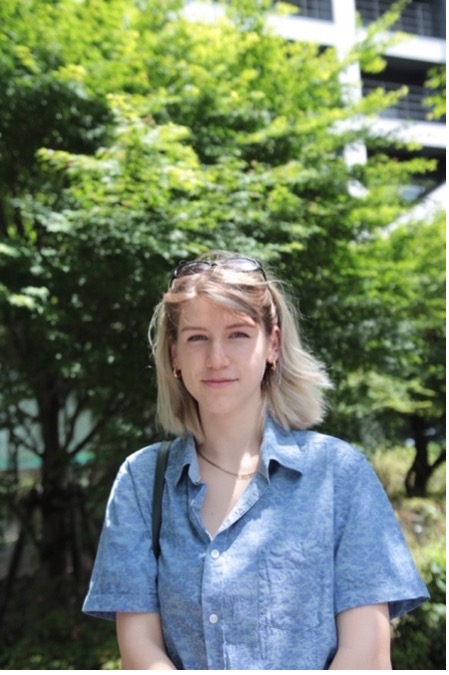
Jodie Steiner in front of Waseda International Student House (WISH dormitory)
After one short trip to Kansai where I did a homestay for a few weeks, I decided to feed my desire to learn more about the habits and customs of Japan. With the blessing of my family, I came back the following year through an exchange program and attended a Japanese high school for eleven months in Tokyo. Unlike the trip to Kansai, which was something of an appetizer, this exchange was to ascertain if I could adapt to a new rhythm of life and to experience many aspects of Japanese society. I met many unforgettable people back then, and some of them happened to study at Waseda Junior & Senior High School. These friends introduced me to Waseda and even showed me around the university campus! I still have a clear memory of that afternoon when we enjoyed coffee at Toyama campus, and I was feeling envious of my friends who could attend such a beautiful university after graduating from high school. I did not imagine back then that I would end up doing the same, but after much consideration, I came back in March 2022 for the third time to complete an undergraduate degree in the Faculty of Social Sciences at Waseda University.
When I made up my mind about going to Japan for university, I knew that I would somehow end up joining a circle. Known as student clubs in other parts of the world, circles are a huge part of the Japanese education system from junior high school all the way up to university. Participation is usually voluntary, and most students decide to join a sport or culture circle. Similarly, university circles form a key element in most students’ social life. In a university as vast as Waseda, you can find any activity you could possibly imagine: sports, traditional and pop culture, linguistics, political debates, drama, arts, and so on.
As a first-year in the Transnational and Interdisciplinary Studies in Social Innovation (TAISI) program since April of this year, it was only in September that I finally decided to join a university circle. My first Japanese teacher in Lausanne was an eccentric man from Osaka. He often used skits to make our lessons more interesting. Thus, from the beginning Japanese comedy held an important place in my relationship with the language. Fond of Owarai (お笑い, a broad term referring to Japanese comedy), the idea of joining a comedy circle seemed like a wonderful way to enhance my life and challenge my linguistic knowledge of Japanese.
An acquaintance in my faculty belongs to one of the many comedy circles of Waseda: Owarai Shuudan POP3. He was kind enough to introduce me to the circle and I ended up going to the shinkan (新歓, or circle orientation) in mid-September. This shinkan is a mandatory step for those who would be potentially interested in joining a circle.
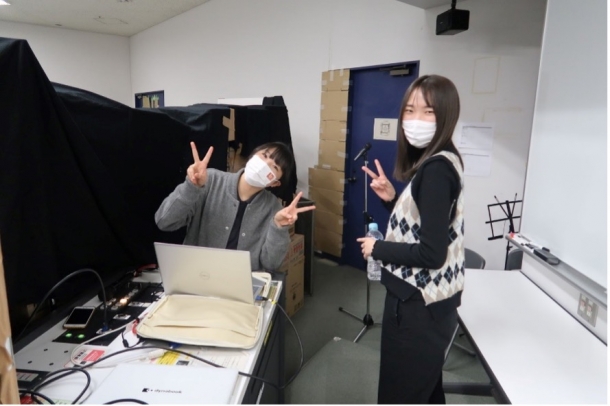
Members learning how to manage the sound effects behind the scenes
The circle members had such colorful personalities and developed sense of humor that led me to make a rather spontaneous decision and join the circle, and this brought me to the Student Center on Toyama campus once a week, where POP3’s meetings take place every Wednesday. It is a five-minute walk from Waseda Campus to get there. The circle’s members are divided into two categories: staff and performers, but as there are no restrictions, some people hold both roles. Not feeling confident enough to perform for now, I enrolled as a staff member, a position that was quite vague initially, but knowing myself I had no doubt I would be up for any challenge!
The first half of the meetings would usually consist of chatting with fellow members or playing games such as Ogiri (大喜利, a contest of who can find the funniest answer to a given question). Staff-role members have a bit more free time as they are mainly active during the events, but the performers are constantly practicing their skits, perfecting their jokes, and presenting them during the second half of the meeting to receive feedback from us all. When the circle meetings come to an end around 7:30pm, those who want to go grab dinner or head off leave, usually mentioning the close deadline of their assignments or other appointments. Between their studies and social life, students can be pretty busy in Tokyo! This rhythm of attending weekly meetings lasted for a few weeks, until mid-October when the circle started preparations for the approaching Waseda Festival 2022, slated for the November 5-6 weekend.
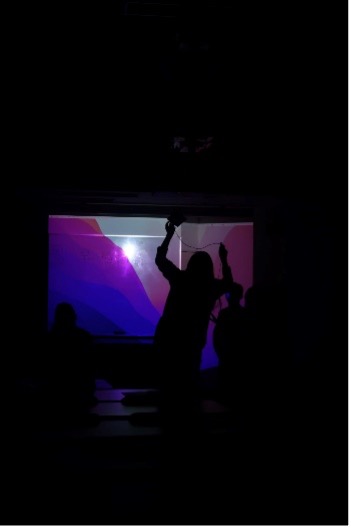
Getting the projector ready for the opener of the festival
On the day of the festival, the Student Center became even more busy than it usually was. Students were buzzing in every direction, arms full of materials to create stage sets and decorations. We, the new staff members, started to receive instructions on how to proceed. The experienced members taught us the basics that would come in handy for the next events: how to design questionnaires for the public, create the sound playlists for our shows, and other small but necessary tasks. Another newcomer made the circle’s opener; a short video to be projected before the show to introduce the members of the circle. I must confess that I watched that video many times, not only to enjoy the beautiful work of my friend, but also to try to remember the names of the members. With performers and staff altogether, there were over 40 members participating in this event and having the memory capacity of a goldfish, this presentation video truly came in handy to get everyone’s names down.
Because of the hierarchical relationships between people within circles, remembering the members’ age/year of study is essential to avoid showing disrespect. Observation and adaptation are two crucial skills that cannot be put aside when joining a circle! I feel the daily effort of learning how to better navigate the language and understanding and participating in social norms as much as possible as someone from a different background, is rewarded with a better integration, smoother conversations, and a clearer understanding of Japan.
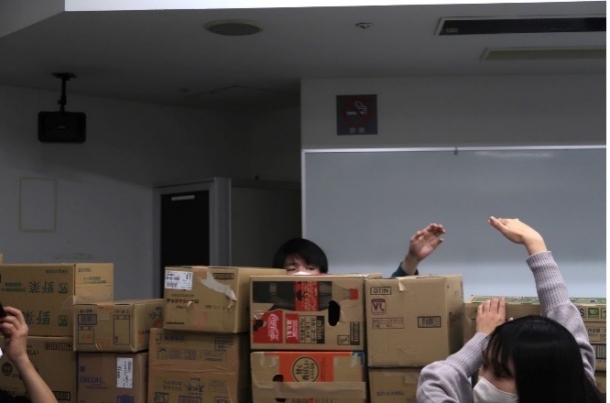
Building the backstage using cardboards
With all our hard work, we were now fully prepared for this year’s festival. Because of Covid-19, the Waseda Festival was held online in 2020, and took place in a hybrid form in 2021. Thus, 2022 was the first time in three years that the festival could be entirely held on-campus like usual. Of course, this wasn’t done without precautions: mandatory masks, submissions of forms stating a normal body temperature, and all the necessary prevention measures. With the guarantee of a safe event, people from various horizons decided to squeeze in, and one week before the festival, all the entry tickets were already sold out.
The university had a day off on Friday, November 4th, but the campus was as busy as usual with circles and organizations getting their stations ready for the weekend. I got there at 9:00am to meet up with my circle members in Building 14. On that day, we transformed the classroom to make it look like a stage and had a rehearsal. Preparations took us the whole day and we left around 7:00pm to come back early the next day.
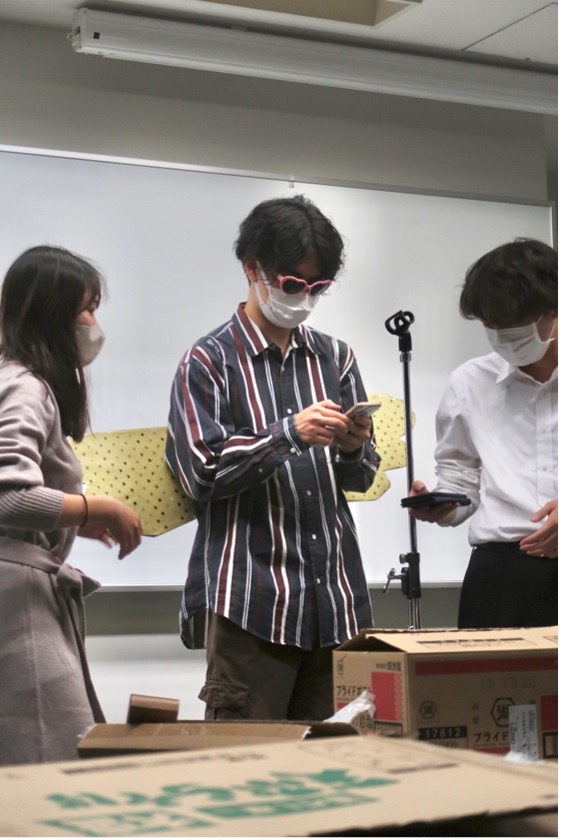
Performers getting their skits ready
I was assigned the responsibility of recording a part of the show, which would later be published on YouTube, and manage the projector during the opening and ending of the performance. We had a total of four shows over the two days. We put in a lot of time and effort for our preparations, and I was worried about how things would go. To my delight, our events were a great success! With a lot more visitors than expected, all the seats were taken, and some people even stood up behind to get to see the performers.
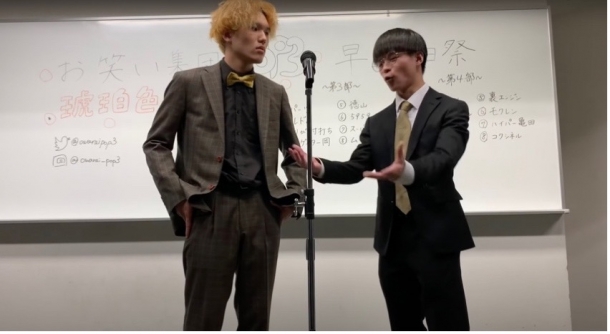
Comedic duo Kokushineru (コクシネル) staging their owairai show
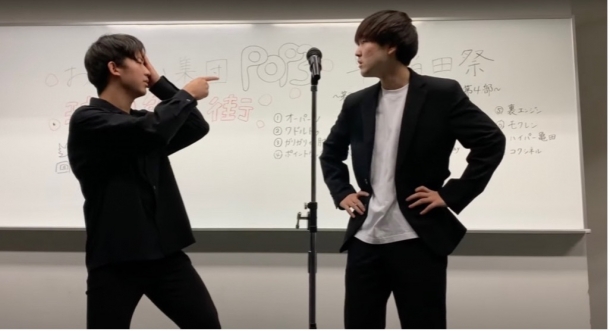
Orunaito (オールナイト)’s presenting their comedic performance
After our successful first show, two friends and I managed to escape outside to have a quick look around the campus which was full to bursting. It was a beautiful autumn day, and we could already see that the festival was a success. The second day went smoothly as expected, and our whole troupe stayed on campus afterwards to clean up the classroom and bring back borrowed materials. This intense three–day span came to an end, and with it a good deal of fatigue. A week later, our circle held a small takoyaki (grilled octopus balls) party to celebrate everyone’s work.
By joining this circle, I expected to make good friends, laugh a lot, and discover more and more about the culture of Japanese comedy that I had already come to appreciate a lot. Beyond that, I was able to witness the enormous effort from my fellow members to put on a show, as well as their inspiring desire to give the best of themselves. Behind each skit hides a long journey that I am privileged enough to see, and for that I am glad of my decision to join this circle. I would definitely recommend other students to join a circle as it gives a unique taste of the Japanese university experience.
Although many circles at Waseda communicate primarily in Japanese, circles that operate in English are also available. Regardless of language ability, many circles offer a warm welcome to any interested students. Moreover, other centers such as the International Cultural Center (ICC) also offer a variety of activities and projects allowing students to explore various aspects of Japanese society. Waseda offers these opportunities for its students, and not making use of them during my remaining time here would be a shame!
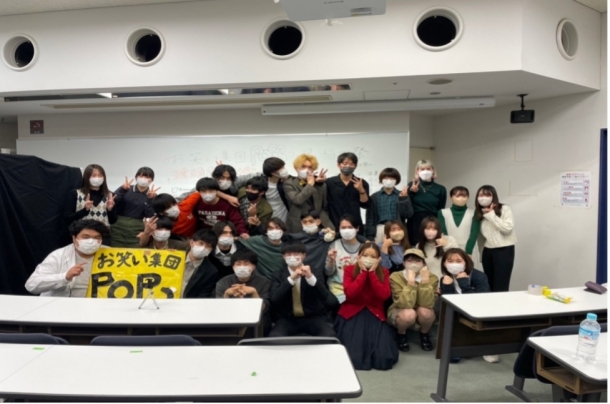
Circle members pose for a group shot
Student Contributor
Jodie Steiner
School of Social Sciences













